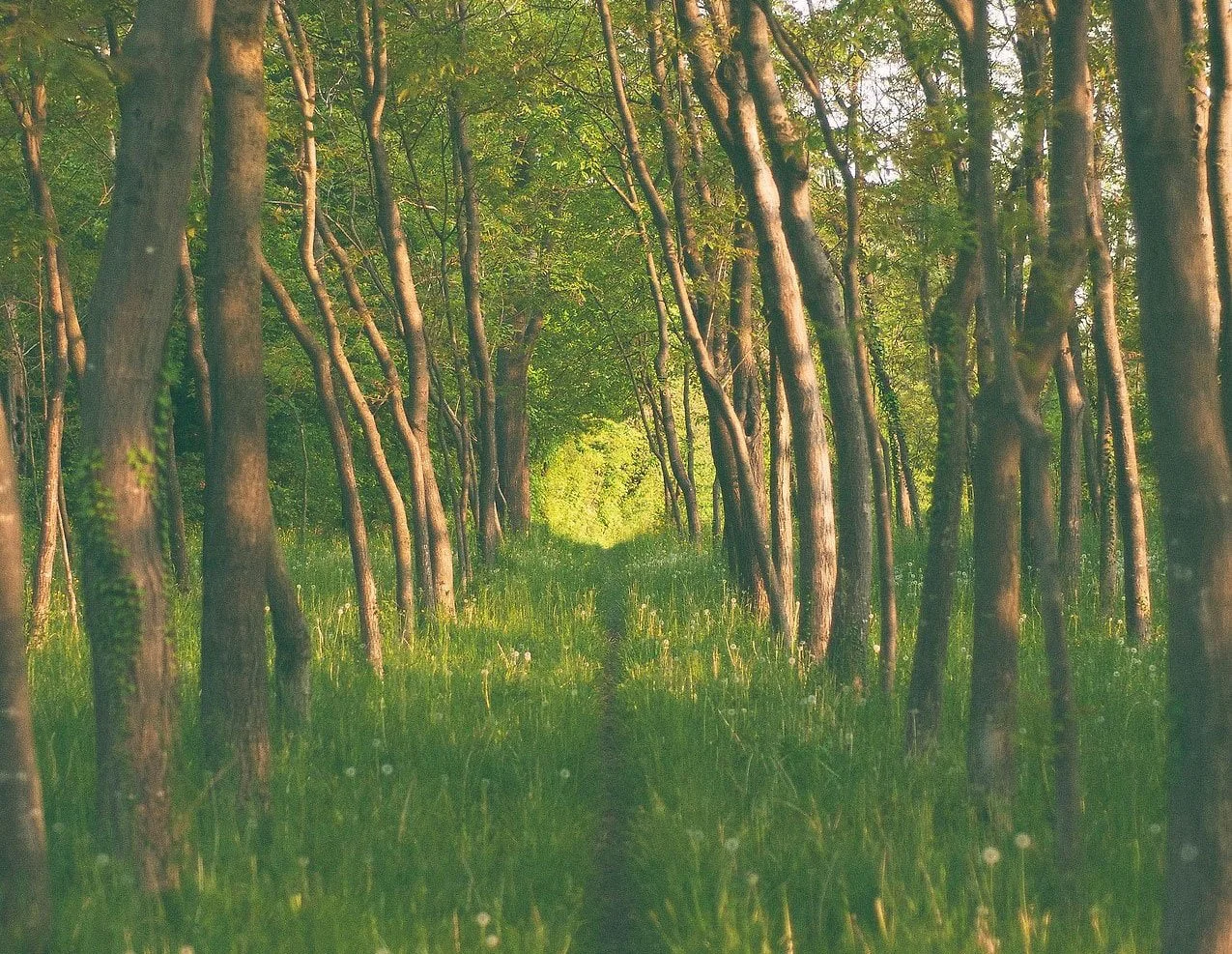Ismail guides listeners through an overview of where we are in our relationship with drugs in the American context, and how this relationship is indicative of our relationship with the Earth and with humanity broadly encouraging us to move beyond the black and white view that some drugs are medicine while others are criminal.
Read MoreBrett shares how mass-incarceration and climate change are not crises of the individual, but of our culture. The abolitionist imagination may be the key to a collective future– as Brett reminds listeners that one can be both practical and utopian.
Read MoreDr. Carroll pushes back against dominant settler histories about Cherokee migrations and relations to homeland and provides insight into what audience members ought to glean from Indigenous philosophies imparting practices of deep reciprocity, responsibility, and relationship to the land and each other.
Read MoreAlexis elucidates that it is only through the messy process of owning up to these broken relations throughout time and seeing how we might participate in and take on culturally appropriate relations of repair, responsibility, friendship, and comradeship in the struggles for liberation that we can survive these times.
Read MoreDr. Osorio guides us into a fuller understanding of aloha by returning the commodified phrase to the more extensive understanding of aloha ‘āina, wherein the possibilities for other worlds are not only born but remembered and recalled from the long history of sovereign Hawai’i and traditional Hawaiian teachings and lifeways.
Read MoreCovering the neuroscience of trauma, the habit of racism, and various typologies of systemic trauma, Dr. Ward provides insight into how we might consciously choose to activate our neuroplasticity toward justice rather than collectively rewarding our neuroplasticity for violence and oppression.
Read MoreWe discuss Kyle’s body of work on dystopia and fantasy in climate justice, the reproduction of settler structures, Indigenous science, vulnerability discourses, and “decolonizing allyship.” Kyle concludes with the ever present reminder that our work must be rooted in consent, reciprocity, and trust.
Read MoreK’asheechtlaa shares the oral history of herring abundance in context to what a typical herring harvest looks like today, industry’s inability to act with reverence, and how Herring Protectors are working to protect the herring and the culture tied to them.
Read MoreALOK shares how challenging the gender binary is not only in service to our collective wellbeing but is a reverential offering in acknowledging our true celestial expansiveness that has been dimmed under binarism, heteronormativity, and colonialism.
Read MoreRuth shares how tending to the future must center Indigenous values and lifeways and shares the ways in which a just transition can be understood as a cyclical movement inspired by kinship, care, and reciprocity
Read MoreIn recognition of the tremendous intricacies of our experiences when it comes to our collective histories, forced severances, and the manipulation of trauma in our society, Prentis shares how embodiment is a resource that allows us to connect with the Earth, recognize grief as an entry point, and shape the impossible into possible.
Read MoreIn this powerful conversation with land defender Sii-am Hamilton, we are invited to discuss futuristic ways forward in recognition that Indigenous communities have been practicing creative resistance against colonialism and capitalism for hundreds of years.
Read MoreCorrina reminds us that Ohlone territory still holds tremendous abundance and that the land can sustain us in a way that would provide for our wellbeing should we choose to really re-examine what it is we need to survive.
Read MoreVijay shares how our morality has eroded under the weight of capitalism and why the disappearance of dignified discourse is connected to calculated divestments from our social and state institutions. This moving episode pushes us to think about how we can organize movements that will truly address quality of life.
Read MoreWe explore the emotional experience behind acupuncture, how a disability justice framework shapes Chiara’s work, the connection between Earth and bodily experienced trauma, and how to create a conducive environment for embodiment.
Read MoreSha’Mira shares that the fashion industrial complex cannot simply be discussed in terms of environmental impact alone, it must be acknowledged as a loud echo of colonial conquest; not just in terms of extraction of labor and resources, or the outsourcing of pollutants and illness, but also in terms of culture and appropriation.
Dr. Patricia Kaishian encourages us to think of mycology as a revolutionary and political practice. Diving into queer mycology, we see the ways that fungi challenge binaries of gender, family structure, and even traditional biological classification.
Read MoreNiria Alicia guides us to think about ancestral instruction, precious purpose, rituals for liberation, and what it means to be human in this time. This warm and rich conversation looks at spiritual crisis in tandem with climate crisis, the allure of self-sabotage, and the problem with the many “solutions” we are offered …
Read MoreChris Zimmer invites us to imagine what clean, healthy rivers can bring us, and to propel love for these rivers towards ethical action. Calling into question international agreements, futures of mining, and responses to climate change, this enduring conversation unsettles and uproots our conceptions of borders.
Read MoreSamuel, a Yurok fisherman and activist, guides us to explore the length of Klamath River restoration and the work that follows in the aftermath, both in terms of ecological restoration and the remediation of ancestral territories.
Read More






![KYLE WHYTE on the Colonial Genesis of Climate Change [ENCORE] /295](https://images.squarespace-cdn.com/content/v1/5403e5dbe4b04db10d1d362b/1578942140884-JHGF2QH6QLC8U6SWI4GB/154_KyleWhyte_ForTheWildPodcast_Image.jpg)
![K’ASHEECHTLAA - LOUISE BRADY on Restoring the Sacred [ENCORE] /288](https://images.squarespace-cdn.com/content/v1/5403e5dbe4b04db10d1d362b/1614952742229-R4ZLOOCN8CIQUX3MP6MX/Louise-Brady_For-The-Wild_Yaa-at-Woone_Still-4_Lee.jpg)
![ALOK on Unruly Beauty [ENCORE] /286](https://images.squarespace-cdn.com/content/v1/5403e5dbe4b04db10d1d362b/1628026864236-HIRDTGMH0WCPPV7JM2H1/ALOK_For-The-Wild_Episode3b.jpg)
![RUTH ŁCHAV'AYA K'ISEN MILLER on Relations of Reciprocity [ENCORE] /283](https://images.squarespace-cdn.com/content/v1/5403e5dbe4b04db10d1d362b/1632177795095-71PK4OPVRWZAL7N389RI/Ruth-Miller_ForTheWild_Episode.jpg)
![PRENTIS HEMPHILL on Choosing Belonging [ENCORE] /281](https://images.squarespace-cdn.com/content/v1/5403e5dbe4b04db10d1d362b/1627329109275-FVIGDLPJ4YMQ79USYWJJ/PrentisHemphill_For-The-Wild_Episode2.jpg)
![SII-AM HAMILTON on Respect-Based Futures [ENCORE] /279](https://images.squarespace-cdn.com/content/v1/5403e5dbe4b04db10d1d362b/1647971243232-C9IP192OJO9ZDFP859K0/Sii-Am_Hamilton_For-The-Wild-Podcast_Episode3.jpg)
![CORRINA GOULD on Settler Responsibility and Reciprocity [ENCORE] /277](https://images.squarespace-cdn.com/content/v1/5403e5dbe4b04db10d1d362b/1647449812310-T5MVLHRMBON1JHIEMB0Z/Corrina-Gould_For-The-Wild_Post2-1.jpg)
![VIJAY PRASHAD on Capitalism’s Erosion of Morality [ENCORE] /268](https://images.squarespace-cdn.com/content/v1/5403e5dbe4b04db10d1d362b/1611945238994-4N9YTRHYQ1KFWRTPO6L9/Vijay-Prashad_For-The-Wild-Podcast_Episode.jpg)





